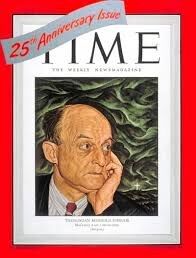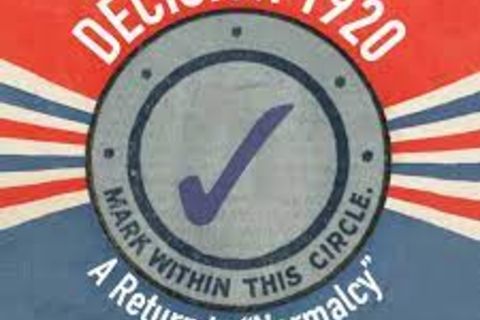The Last American Prophet

REINHOLD NIEBUHR
Most Influential 20th Century American Theologian
Pastor, Writer, Professor at Union Theological Seminary, Political Commentator and
1964 Presidential Medal of Freedom recipient
6/21/1892 – 6/1/1971
Early Life: Reinhold Niebuhr, born in 1892 into a Lutheran German family, earned his Masters at Yale Divinity School and began pastoring at Bethel Evangelical Church [United Church of Christ] in Detroit (1915). He always regretted not getting a doctorate, especially when many on the faculty of Union held it against him in getting a professorship there.
Pastoring in Detroit (1915-1928): He was not only attracted German Americans, but attracted black and white migrants from the rural South as well as connecting with the Jewish and Catholic communities as well. Many of his parishioners were working class, many who worked at Henry Ford’s auto plant. Pastor Niebuhr was aware of working conditions and witnessed the consequences to the workers who were laid off.
Niebuhr said, “I cut my teeth fighting Ford.” Niebuhr was grateful Ford hired women, African Americans and the handicapped, but helped expose how Ford fired older workers depriving them of a living, pension and leaving them destitute. He was troubled by the demoralizing effects of industrialism and allowed union organizers to speak from his pulpit. He understood how working in a factory could be demoralizing and life on an assembly line could lead to a life of drudgery.
Niebuhr also believed anyone going into ministry should begin by working in an urban center for at least five years to prepare them for lifelong ministry.
World War I (1917): All German American culture in the U.S. and Canada came under suspicion for having dual loyalties. Niebuhr encouraged German Americans to be loyal to the U.S., and after having seen the conditions of the Rhineland under French occupation, fashioned an ethical perspective of patriotism and pacifism.
Niebuhr’s Theological Growth: Niebuhr use to believe in the Social Gospel, that humanity is essentially good, and the Kingdom of God would be ushered in if only everyone did their part. His view of optimistic liberalism, the goodness of man and the inevitability of human progress was corrupted by self-interest, especially corporate greed.
He was 1) shocked by self-greed, 2) corporate greed, and 3) the church’s lack of response to do anything about it. He turned to the doctrine of original sin, that humanity needed God’s grace and the only truth and power were in Christ. His belief in harmony and love was adhering to the commandment of loving God and our neighbor.
In his life he engaged in public conversations about worker rights, the nature of power, civil rights, the use of military force, interfaith relationships and more. He warned, “The church service is not an end in itself, but must comfort and challenge to bring people in.” He also believed when religion gets too close to the halls of power, it gets co-opted.
Union Theological Seminary in NYC (1928-1960): Niebuhr left Detroit and became a Professor of Practical Theology. He influenced many generations of students, the most famous was Dietrich Bonhoeffer, who went back to Germany during World War II in the anti-Nazi Confessing Church.
Christian Realism [Justice]: He was an American original with unique insights into human nature and its relationships to political movements and social justice.
Niebuhr said, “We must take, morally hazardous actions to preserve our civilization. We must exercise our power.” In other words, he told the U.S. to use its weight, but don’t pretend your motives are pure, and don’t be shocked if you achieve less than justice. Thus in line with Dietrich Bonhoeffer who said “If I have the chance to shoot a driver who is going to kill dozens with his vehicle, I must do so.”
This is the rational Bonhoeffer used in a plot to kill Hitler. This is the rational Niebuhr used as a Christian Realist, sometimes it is okay to kill.
Niebuhr said, “There are historic situations in which refusal to defend the inheritance of a civilization, however imperfect, against tyranny and aggression may result in consequences even worse than war.”
He also said, “Goodness armed with power is corrupted; and pure love without power is destroyed.”
1938-40 Gifford Lectures: The lectures given in northern Scotland are the equivalent to a theologian of winning a Nobel Peace Prize. From his lectures came The Nature and Destiny of Man, where he provided a synthesis of insights from the Reformation and of the Renaissance with its hopefulness and cultural achievements.
Books by Reinhold Niebuhr:
Moral Man & Immoral Society (1932)
The Nature & Destiny of Man (1941-43)
The Irony of American History (1952)
Editor of Christianity & Crisis (1941-1966)
Historical Circumstances in Niebuhr’s Life: Reinhold Niebuhr’s career spanned through WWI, The Great Depression, WWII, the Korean War, The Cold War and the Vietnam War. He was followed by J. Edgar Hoover’s FBI since Niebuhr was belonged to Socialist organizations, but in time he served as a consultant to the State Department in the Cold War period.
Socialist: He started the Fellowship of Socialist Christians and ran for office as a Socialist. In the 1930’s he broke with the Socialists over their pacifism and non-interventionist policy in foreign policy. He persuaded many Christian pacifists to support the war against Hitler. In the 1940’s, he became a left-wing anti-communist Democrat and became vice chairman of the Liberal Party in the state of New York. He also was an early opponent to the U.S. participating in the Vietnam War.
A Democratic Socialist is one who seeks to restrain the self-destructive excesses of capitalism and channel government’s use of tax money into creating opportunities for everyone. Democratic Socialists believe that both the economy and society should be run democratically to meet human needs, not simply for making profits for a greedy few.
Democracy: Niebuhr said, “The best we can do as human beings is to generate democratic possibilities. Democracy is a proximate solution to insoluble problems.” He also said, “The sad duty of politics is to establish justice in a sinful world.”
Serenity Prayer: Niebuhr wrote the prayer that would become the hallmark saying of Alcoholics Anonymous, and all other 12 step groups to follow.
Grant me the serenity to accept the things I cannot change, the courage to change the things I can,
and the wisdom to know the difference (1933).
Preacher: Hew was popular in the university chapel speaking circuit from the 1920’s-1950’s. After his stroke in 1952, many of his public activities were seriously limited, but he was able to continue his teaching a writing.
Martin Luther King: Andrew Young in the 2017 PBS Documentary “An American Conscience: the Reinhold Niebuhr Story,” that Dr. King reminded people that Reinhold Niebuhr reminded us that groups tend to be more immoral than individuals, and that his teaching kept us from being naïve about evil structures in society. Others who influenced MLK were Jesus, Gandhi, Walter Rauschenbusch, and Paul Tillich.
Niebuhr’s Influence: His influence has extended to political scientists such as George Kenan, Samuel Huntington, and Arthur Schlesinger; mainline Protestant clergy; Rev. Dr. Martin Luther King and most recently politicians such as Barack Obama, Hillary Clinton, Madeleine Albright, Hillary Clinton and John McCain.
Reinhold’s Brother - Theologian H. Richard Niebuhr
In Christ and Culture, Richard came up with the following profile of congregation’s relationship to the world.
- Church against the world
- Church with the world
- Church above the world
- Church and world in paradox
QUESTION: Where are the public theologians today? David Brooks, columnist of the NY Times says, “We basically don’t have them anymore.”
Support CosmoFunnel.com
You can help support the upkeep of CosmoFunnel.com via PayPal.






